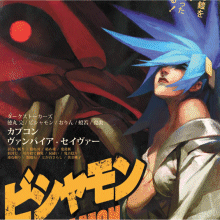
Thanks to a housemate of mine recently picking up Final Fantasy XIII, I've recently been dabbling in it's delights, when previously I had no intention to do so. I was less than keen on VII's treatment as a "project" rather than just a game, partly due to that aspect of it being decided much further down the line. With XIII supposedly going to be a project that's double the size of VII, I decided I'd rather avoid getting involved entirely.
Despite that, seeing it in action did help. While it's rarely a strong selling point for me, the graphics and presentation are gorgeous, even though I'm currently limited to an aged SDTV, it still doesn't fail to impress. If I do enjoy it enough to see it through to the end, I could potentially return to it at a later date in HD, which is has clearly been made for, as shown by it's large borders and occasionally minuscule text.
While I don't intend to get too involved in talking about the storyline, I feel it's worth saying that it's actually rather good so far. It's told in a very disjointed pattern, with the game beginning near the end, and then sometimes hopping back in the timeline to fill in the blanks on character history and motivations. It helps that it's done well, some RPGs have tried this before and it just didn't really work that well. It's not quite as sparse as XII, and definitely not as compressed and simplified as X was. It's something close to a happy medium. It is very cutscene heavy though, moreso than usual, so it's less tedious than some games make it.
Music wise, I'm very impressed. It's changed again from XII, which had Hitoshi Sakimoto doing the soundtrack. Having previously worked on titles like Ogre Battle and Odin Sphere, the grandeur his music offers was very well suited, but obviously with XIII being rather different, that wouldn't really fit. Instead, they've gone with Masashi Hamauzu, who I've only experienced before in Unlimited Saga. It's a not more contemporary and varied, something which lends itself very well to XIII. While it's always a shame to not have Uematsu on board, more variety like this is definitely something that Final Fantasy as a whole can benefit from.
The game's system and battle sequences have been drastically streamlined, with levelling and recovery being removed entirely. It seems like less of a solid RPG, and more like an extended cutscene with RPG elements in it. While I'm still in the early stages, character customisation seems to present itself as an illusory method of decision making. While you can develop a character as you progress with new abilities, it's very linear, meaning you can quite happily continue through the game with the required skills and statistics available to you. While I do often agree with the idea of cutting out needless complication in games, it seems a bit misleading to present the player with the idea that they're developing a character when really, that could also be done automatically. I've yet to encounter any difficulty spikes as it's all so linear at the moment.
That's not to say that I'm not enjoying it, however. One thing it does succeed with is offering an enjoyable experience. While I was quite happy to let this one pass me by, I've found myself hooked to some degree. I'm not sure yet if I'll consider it one of my favourites, but for the time being it's a nice little distraction. It just so happens that playing such a simple RPG, I'm finding myself even more eager to sink my teeth into something like Dragon Quest.


